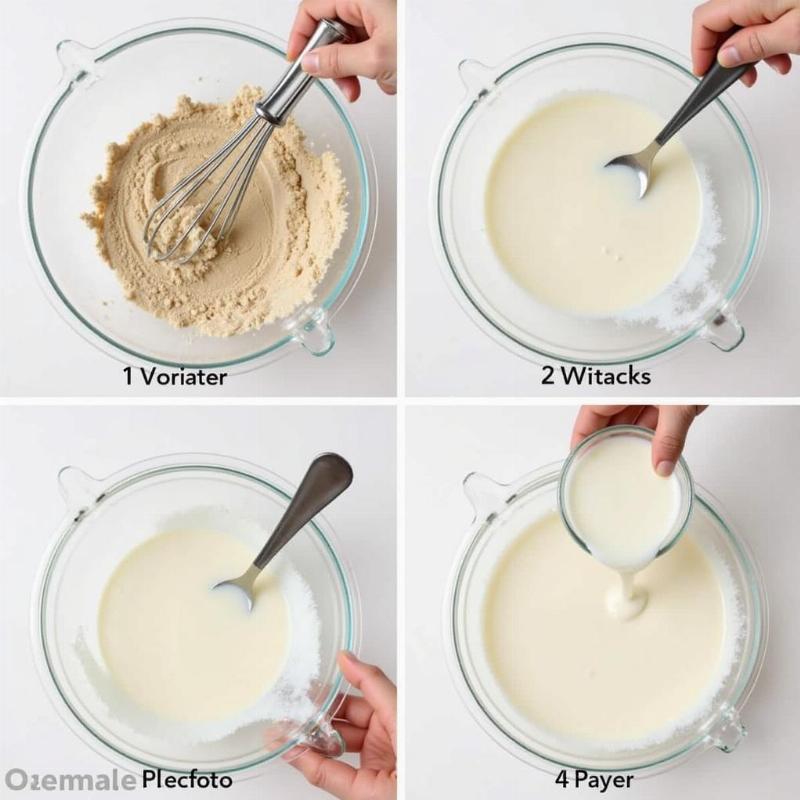Powdered goat’s milk has become a popular supplement for dogs in recent years, touted for its potential health benefits. But is it all hype or can this trendy treat truly enhance your canine companion’s well-being? This article delves into the nutritional profile of powdered goat’s milk for dogs, explores its potential advantages and disadvantages, and offers practical guidance for incorporating it into your dog’s diet. We’ll examine whether it’s the right choice for your furry friend, considering various breeds, ages, and health conditions.
Goat’s milk, in its various forms, has been a staple in human diets for centuries. More recently, it has found its way into the pet food aisle, often in powdered form for convenience. Many dog owners are curious about its benefits, especially for dogs with sensitive stomachs or specific dietary needs. This article will help you understand the science behind the trend and make informed decisions about your dog’s nutrition.
Nutritional Benefits of Powdered Goat’s Milk for Dogs
Powdered goat’s milk is packed with essential nutrients. It’s a good source of protein, crucial for muscle development and repair. It also provides calcium and phosphorus, vital for strong bones and teeth. Vitamins like A, B-complex, and D contribute to overall health, supporting vision, energy levels, and immune function. Moreover, goat’s milk is rich in electrolytes, which can be especially beneficial for hydration after exercise or during illness.
While these nutrients are beneficial, it’s important to note that goat’s milk is not a complete and balanced food for dogs. It should be used as a supplement, not a replacement, for a high-quality dog food formulated to meet AAFCO standards.
Is Powdered Goat’s Milk Right for Your Dog?
Powdered goat’s milk can be a beneficial supplement for many dogs, particularly those with digestive issues. Its smaller fat globules and different protein structure compared to cow’s milk often make it easier to digest. It can be a helpful addition for puppies needing a nutritional boost, senior dogs with decreased appetite, or dogs recovering from illness. However, not all dogs tolerate goat’s milk well.
Some dogs are lactose intolerant, and while goat’s milk contains less lactose than cow’s milk, it can still trigger sensitivities in susceptible individuals. Always introduce powdered goat’s milk gradually and monitor your dog for any signs of digestive upset, such as diarrhea or vomiting. Consult with your veterinarian if you have any concerns.
How to Incorporate Powdered Goat’s Milk into Your Dog’s Diet
Adding powdered goat’s milk to your dog’s diet is easy. Follow the package instructions for reconstituting the milk powder with water. You can offer it as a standalone treat, mix it with their food, or use it to rehydrate kibble. Start with a small amount and gradually increase the portion as tolerated. Avoid overfeeding, as too much goat’s milk can lead to weight gain or digestive problems.
 Preparing Powdered Goat's Milk for Dogs
Preparing Powdered Goat's Milk for Dogs
Choosing the Right Powdered Goat’s Milk Product
When selecting powdered goat’s milk for your dog, look for products specifically formulated for pets. Avoid human-grade goat’s milk powder, as it may contain additives that are not safe for dogs. Choose a reputable brand that meets AAFCO standards and look for options with minimal added ingredients. Always check the expiration date and store the powder in a cool, dry place to maintain freshness.
Conclusion
Powdered goat’s milk can be a nutritious and palatable supplement for dogs, offering a range of potential benefits, particularly for those with digestive sensitivities. However, it’s crucial to introduce it gradually, monitor your dog for any adverse reactions, and choose a high-quality product formulated specifically for pets. Consult your veterinarian to determine if powdered goat’s milk is a suitable addition to your dog’s individual dietary needs. Remember, a balanced diet and regular veterinary care are essential for ensuring your canine companion’s long-term health and well-being.
FAQ
-
Can puppies drink powdered goat’s milk? Yes, powdered goat’s milk can be a beneficial supplement for puppies, providing extra nutrients and supporting growth.
-
What are the signs of lactose intolerance in dogs? Signs of lactose intolerance in dogs include diarrhea, vomiting, gas, and abdominal discomfort.
-
Can I give my dog goat’s milk every day? You can give your dog goat’s milk daily, but moderation is key. Follow the recommended serving size and adjust as needed based on your dog’s individual needs and tolerance.
-
Is powdered goat’s milk good for senior dogs? Yes, powdered goat’s milk can be a good option for senior dogs, as it’s easily digestible and provides essential nutrients that may be lacking in their diet.
-
Where can I buy powdered goat’s milk for dogs? You can purchase powdered goat’s milk for dogs at pet stores, online retailers, and some veterinary clinics.
-
How should I store powdered goat’s milk? Store powdered goat’s milk in a cool, dry place, away from direct sunlight and moisture.
-
What if my dog doesn’t like the taste of goat’s milk? Try mixing a small amount with their regular food or offering it as a frozen treat.
Beautdogs.us is your trusted source for comprehensive and engaging information on dog care and companionship in the USA. We offer expert advice on breeds, nutrition, training, and overall wellness, catering to both new and experienced dog owners. Explore our website for a wealth of resources and product recommendations to help you provide the best possible care for your furry friend. Contact us for personalized guidance: Email: [email protected], Phone: +1 501-555-7529. Visit Beautdogs.us today!